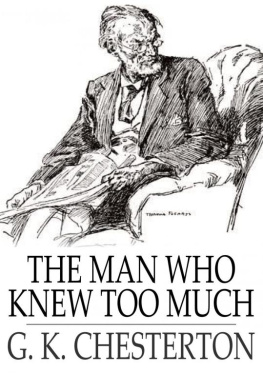Gilbert Chesterton - Manalive
Here you can read online Gilbert Chesterton - Manalive full text of the book (entire story) in english for free. Download pdf and epub, get meaning, cover and reviews about this ebook. year: 1912, publisher: Thomas Nelson and Sons, genre: Prose. Description of the work, (preface) as well as reviews are available. Best literature library LitArk.com created for fans of good reading and offers a wide selection of genres:
Romance novel
Science fiction
Adventure
Detective
Science
History
Home and family
Prose
Art
Politics
Computer
Non-fiction
Religion
Business
Children
Humor
Choose a favorite category and find really read worthwhile books. Enjoy immersion in the world of imagination, feel the emotions of the characters or learn something new for yourself, make an fascinating discovery.

- Book:Manalive
- Author:
- Publisher:Thomas Nelson and Sons
- Genre:
- Year:1912
- Rating:5 / 5
- Favourites:Add to favourites
- Your mark:
- 100
- 1
- 2
- 3
- 4
- 5
Manalive: summary, description and annotation
We offer to read an annotation, description, summary or preface (depends on what the author of the book "Manalive" wrote himself). If you haven't found the necessary information about the book — write in the comments, we will try to find it.
Manalive — read online for free the complete book (whole text) full work
Below is the text of the book, divided by pages. System saving the place of the last page read, allows you to conveniently read the book "Manalive" online for free, without having to search again every time where you left off. Put a bookmark, and you can go to the page where you finished reading at any time.
Font size:
Interval:
Bookmark:
Gilbert Keith Chesterton
Manalive
Part I
The Enigmas of Innocent Smith
Chapter I
How the Great Wind Came to Beacon House
A wind sprang high in the west, like a wave of unreasonable happiness, and tore eastward across England, trailing with it the frosty scent of forests and the cold intoxication of the sea. It a million holes and corners it refreshed a man like a flagon, and astonished him like a blow. In the inmost chambers of intricate and embowered houses it woke like a domestic explosion, littering the floor with some professors papers till they seemed as precious as fugitive, or blowing out the candle by which a boy read Treasure Island and wrapping him in roaring dark. But everywhere it bore drama into undramatic lives, and carried the trump of crisis across the world. Many a harassed mother in a mean backyard had looked at a five dwarfish shirts on the clothes-line as at some small, sick tragedy; it was as if she had hanged her five children. The wind came, and they were full and kicking as if five fat imps had sprung into them; and far down in her oppressed subconscious she half-remembered those coarse comedies of her fathers when the elves still dwelt in the homes of men. Many an unnoticed girl in a dank walled garden had tossed herself into the hammock with the same intolerant gesture with which she might have tossed herself into the Thames; and that wind rent the waving wall of woods and lifted the hammock like a balloon, and showed her shapes of quaint clouds far beyond, and pictures of bright villages far below, as if she rode heaven in a fairy boat. Many a dusty clerk or cleric, plodding a telescopic road of poplars, thought for the hundredth time that they were like the plumes of a hearse; when this invisible energy caught and swung and clashed them round his head like a wreath or salutation of seraphic wings. There was in it something more inspired and authoritative even than the old wind of the proverb; for this was the good wind that blows nobody harm.
The flying blast struck London just where it scales the northern heights, terrace above terrace, as precipitous as Edinburgh. It was round about this place that some poet, probably drunk, looked up astonished at all those streets gone skywards, and (thinking vaguely of glaciers and roped mountaineers) gave it the name of Swiss Cottage, which it has never been able to shake off. At some stage of those heights a terrace of tall gray houses, mostly empty and almost as desolate as the Grampians, curved round at the western end, so that the last building, a boarding establishment called Beacon House, offered abruptly to the sunset its high, narrow and towering termination, like the prow of some deserted ship.
The ship, however, was not wholly deserted. The proprietor of the boarding-house, a Mrs. Duke, was one of those helpless persons against whom fate wars in vain; she smiled vaguely both before and after all her calamities; she was too soft to be hurt. But by the aid (or rather under the orders) of a strenuous niece she always kept the remains of a clientele, mostly of young but listless folks. And there were actually five inmates standing disconsolately about the garden when the great gale broke at the base of the terminal tower behind them, as the sea bursts against the base of an outstanding cliff.
All day that hill of houses over London had been domed and sealed up with cold cloud. Yet three men and two girls had at last found even the gray and chilly garden more tolerable than the black and cheerless interior. When the wind came it split the sky and shouldered the cloudland left and right, unbarring great clear furnaces of evening gold. The burst of light released and the burst of air blowing seemed to come almost simultaneously; and the wind especially caught everything in a throttling violence. The bright short grass lay all one way like brushed hair. Every shrub in the garden tugged at its roots like a dog at the collar, and strained every leaping leaf after the hunting and exterminating element. Now and again a twig would snap and fly like a bolt from an arbalist. The three man stood stiffly and aslant against the wind, as if leaning against a wall. The two ladies disappeared into the house; rather, to speak truly, they were blown into the house. Their two frocks, blue and white, looked like two big broken flowers, driving and drifting upon the gale. Nor is such a poetic fancy inappropriate, for there was something oddly romantic about this inrush of air and light after a long, leaden and unlifting day. Grass and garden trees seemed glittering with something at once good and unnatural, like a fire from fairyland. It seemed like a strange sunrise at the wrong end of the day.
The girl in white dived in quickly enough, for she wore a white hat of the proportions of a parachute, which might have wafted her away into the coloured clouds of evening. She was their one splash of splendour, and irradiated wealth in that impecunious place (staying there temporarily with a friend), an heiress in a small way, by name Rosamund Hunt, brown-eyed, round-faced, but resolute and rather boisterous. On top of her wealth she was good-humoured and rather good-looking; but she had not married, perhaps because there was always a crowd of men around her. She was not fast (though some might have called her vulgar), but she gave irresolute youths an impression of being at once popular and inaccessible. A man felt as if he had fallen in love with Cleopatra, or as if he were asking for a great actress at the stage door. Indeed, some theatrical spangles seemed to cling about Miss Hunt; she played the guitar and the mandoline; she always wanted charades; and with that great rending of the sky by sun and storm, she felt a girlish melodrama swell again within her. To the crashing orchestration of the air the clouds rose like the curtain of some long-expected pantomime.
Nor, oddly, was the girl in blue entirely unimpressed by this apocalypse in a private garden; though she was one of most prosaic and practical creatures alive. She was, indeed, no other than the strenuous niece whose strength alone upheld that mansion of decay. But as the gale swung and swelled the blue and white skirts till they took on the monstrous contours of Victorian crinolines, a sunken memory stirred in her that was almost romancea memory of a dusty volume in Punch in an aunts house in infancy: pictures of crinoline hoops and croquet hoops and some pretty story, of which perhaps they were a part. This half-perceptible fragrance in her thoughts faded almost instantly, and Diana Duke entered the house even more promptly than her companion. Tall, slim, aquiline, and dark, she seemed made for such swiftness. In body she was of the breed of those birds and beasts that are at once long and alert, like greyhounds or herons or even like an innocent snake. The whole house revolved on her as on a rod of steel. It would be wrong to say that she commanded; for her own efficiency was so impatient that she obeyed herself before any one else obeyed her. Before electricians could mend a bell or locksmiths open a door, before dentists could pluck a tooth or butlers draw a tight cork, it was done already with the silent violence of her slim hands. She was light; but there was nothing leaping about her lightness. She spurned the ground, and she meant to spurn it. People talk of the pathos and failure of plain women; but it is a more terrible thing that a beautiful woman may succeed in everything but womanhood.
Its enough to blow your head off, said the young woman in white, going to the looking-glass.
The young woman in blue made no reply, but put away her gardening gloves, and then went to the sideboard and began to spread out an afternoon cloth for tea.
Enough to blow your head off, I say, said Miss Rosamund Hunt, with the unruffled cheeriness of one whose songs and speeches had always been safe for an encore.
Font size:
Interval:
Bookmark:
Similar books «Manalive»
Look at similar books to Manalive. We have selected literature similar in name and meaning in the hope of providing readers with more options to find new, interesting, not yet read works.
Discussion, reviews of the book Manalive and just readers' own opinions. Leave your comments, write what you think about the work, its meaning or the main characters. Specify what exactly you liked and what you didn't like, and why you think so.




